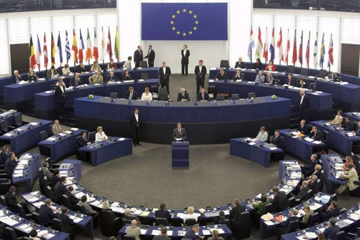The resolutions of the December 8-9 EU summit which had evoked heightened expectations eventually left a mixed impression. The official agenda of the forum appeared all-embracing, with the leaders of the 27 countries of the united Europe touching upon every issue from the Balkan politics and Iran's nuclear problem to the Schengen regime, but no specific and binding decisions concerning any of them followed. Though on the surface the outcome may be blamed on the lack of the necessary consensus in the EU over the handling of individual problems, the profound reason is that the alliance is facing a widening rift which generally impairs its ability to act as a muscular and independent player internationally.
Throughout the past several weeks, Great Britain and France drew a considerable amount of criticism for causing headaches to Brussels, but, from a fresher perspective, both are at the moment contributing substantially to the EU. The two countries, each in its own way, prevent the EU from degenerating into a giant bureaucratic machine ready to seal without deliberation externally supplied resolutions which are not necessarily consonant with the European interests.
The picture of the economic debates at the EU summit is lucid: the Berlin-Paris duo's push for the Lisbon Treaty amendment predictably met with the British veto. The antipathy between D. Cameron and N. Sarkozy is not the real explanation: rather, London has read the German-French proposals as steps towards breaking the EU into the distinct camps of Euro and non-Euro countries. A participant of the informal part of the Brussels talks who spoke on conditions of anonymity spelled out the wider context of the situation: the British premier was convinced that he was entitled to insert something from his own wishlist – Great Britain's interests in the integrated EU market plus the untouchable status for London's financial services sector – into the Treaty if it were to be edited. While the former are to an extent accommodated in various EU resolutions, the latter would keep the British financial center immune to a new round of Brussels' regulations, an arrangement to which the architects of the new fiscal union to be built on the basis (or on the ruins?) of the EU obviously cannot consent. The global finances are notably more receptive to the assessments churned out by Standard and Poor's than to EU Council President Herman Van Rompuy's promises that the fiscal union would help Europe maintain stability in the long term. So far, disappointment over the EU summit led the S&P analysts to look into shaving a couple of grades in a single move off the French rating.
To make things worse, the final text containing the new EU fiscal principles will not come into being before March 2012, meaning that the corresponding regulations can only be enacted in 2013. No doubt, things will be evolving in and outside of Europe over the period of time, and a lot will depend on how Brussels reacts to the developments in and around the regions important to the EU – the Balkans, the Middle East, and Iran – and whether Brussels' foreign-policy approaches are going to be adequate and balanced.
There was a feeling initially that, in contrast to the debates over the Euro-rescue measures, the discussion of Iran's nuclear program at the EU summit would proceed without much controversy. In the run-up to the forum, Paris and London submitted to the EU diplomacy chiefs a plan for sweeping sanctions on the country and, considering that Berlin similarly advocates exerting maximal pressure on Tehran, the embargo seemed imminent. However, as on many other occasions, Greece presented the European heavyweights with a problem. Athens mounts opposition to oil sanctions on Iran as the country supplies a third of the Greek oil import. Moreover, an escalation around Iran would spread turbulence across the global energy market, and Tehran already threatens that the cost of crude would jump to $250 per barrel from the current $100 if the conflict gains additional momentum. The EU economic champions do have the potential to balance their markets if such problems arise, whereas the weaker Greece evidently does not. Italy, another importer of the Iranian oil and a country with serious financial problems on the horizon, reportedly also expressed skepticism over the oil embargo.
As a result, the EU summit failed to reach consensus on the oil sanctions against Iran. The summit statement said that the 27-nation bloc should "proceed with work related to extending the scope of EU restrictive measures and broadening existing sanctions by examining additional measures against Iran as a matter of priority”. The term “oil embargo” is absent from the summit resolutions, with the forum's participants recognizing informally that the technical aspects and economic consequences of the oil sanctions against Iran require scrupulous analysis. It should be taken into account that an oil market destabilization would send the energy prices, including Russia's exports, sky-rocketing, and such scenarios play out on a higher level of the global energy game.
The EU foreign ministries will revisit the theme of the oil embargo against Iran by the end of December, and the corresponding resolutions will materialize in January, 212 or later. The EU is currently confronted with a tough dilemma: it can either focus on restoring the financial health of Greece and its other problem-ridden countries or get drawn into the Middle Eastern geopolitical confrontations, quite possibly at the cost of the viability of Euro.
Naturally, new EU candidacies moved deep into the background of Brussels' agenda under the circumstances. The EU did sign a technical deal with Croatia which should enable the country to become a member starting on July 1, 2013, but, mainly under Austria's influence, the bid staked by Serbia was once again shelved, this time – till March, 2012.
The opinion of the author may not coincide with the position of editorial
read more in our Telegram-channel https://t.me/The_International_Affairs

 15:00 16.12.2011 •
15:00 16.12.2011 •























